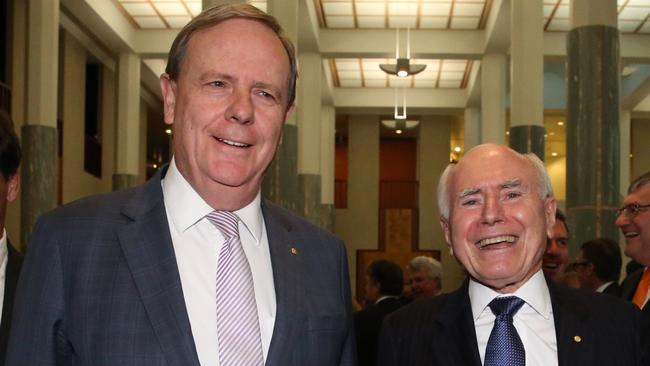John Howard and Peter Costello urge PM to keep building budget surplus
John Howard and Peter Costello have urged the Morrison government not to squander the budget surplus on a short-term stimulus.

John Howard and Peter Costello have urged the Morrison government not to squander the budget surplus on a short-term stimulus, while doubting whether monetary policy is still a useful economic instrument given the reduction in interest rates to historic lows.
“The government is absolutely right to be returning the budget to surplus and I think it’s right to anchor its fiscal policy to producing surpluses over the next four years,” Mr Costello, the nation’s longest-serving treasurer, told The Australian.
“These spends never end up being short-term. We opened up this wedge between revenues and expenditures and bit by bit we’ve clawed it back mainly on the revenue side … this is a great achievement for the government to get the budget back to surplus, but it has taken a long time.” Mr Howard also does not see the need for a stimulus to the economy at this time. “I support the line that Josh Frydenberg has taken, and Scott Morrison, on the surplus,” he told The Australian. “Very much so.”
As forecasts for economic growth, household consumption and wages have been downgraded, and $21.6bn wiped from future surpluses, Mr Costello said he doubted whether monetary policy was still a useful economic lever.
“Monetary policy has run out of puff,” he said. “Once you get interest rates at near-zero levels, whether they’re at 0.75 per cent, 0.5 per cent, 0.25 per cent, it just doesn’t matter, it’s lost its power as an economic instrument and that is why when the Reserve Bank cut rates during the course of (last) year it had no discernible effect.”
Mr Howard also questioned the economic benefit of slashing the official cash rate from 4.75 per cent to 0.75 per cent over the past decade.
“For a long time monetary policy was carrying the whole load because fiscal policy was so lax,” the former prime minister said. “I don’t resile from my criticism of the Reserve Bank in cutting interest rates too far. I have felt for a couple of years that rates have been cut too far. I would have kept interest rates higher but it has chosen not to.”
In exclusive interviews to mark the release of the 1998-99 cabinet papers today, which include the introduction of the landmark goods and services tax in return for the abolition of wholesale sales tax and several state indirect taxes, Mr Howard and Mr Costello said state governments should be more accountable for how they spent GST revenue and flagged reform.
“I think all governments should be accountable for everything they do,” Mr Howard said.
“There is a case for further reform in that area. We still rely too heavily on personal income tax as a source of revenue. The global financial crisis reminded us of the ill wisdom of the Senate taking the GST off fresh food because the demand for fresh food is inelastic, whereas the demand for everything other than that is elastic. The GFC hurt the revenue-raising base of the states quite severely, largely because of the absence of GST on fresh food.”
Mr Costello was more critical of the states. “Not all the states abolished all the taxes in the end,” he said. “They’ve cribbed back a few of these nuisance taxes. That was not the spirit of the reform; the spirit was once they went, they went for good. Some of their stamp duties, they have cribbed back.
“Commonwealth-state financial relations, that to me is the really big reform needed in Australia, not just the financial relations but areas of responsibility.
“We’ve got to think of a way to make the states clearly accountable in certain areas with a revenue base to support them without this constant bleating that it’s all Canberra’s fault and that Canberra’s got to give us more money.”
Mr Costello acknowledged a broader GST base would be more efficient but almost impossible politically to change, along with the rate, as state and federal governments had to agree.
Cabinet papers released by the National Archives today document how the Howard government stared down anxiety within cabinet to introducing a GST; how ministers resisted efforts to maintain a budget surplus; deliberations over the republic referendum and a constitutional preamble; waterfront reform; a crackdown on welfare fraud with “optical surveillance”; implementation of the work-for-the-dole scheme; warnings about the possible disastrous impact of the Y2K bug; and other matters.
Reflecting on radical changes to the taxation system, implemented 20 years ago this year, the former prime minister said it held lessons for how to achieve lasting economic reform. “We were able to get it through due to a combination of there being a grudging acceptance that this was a reform whose time had come; (and) an acceptance of the argument that it is better to tax spending than overtax income,” Mr Howard said.




To join the conversation, please log in. Don't have an account? Register
Join the conversation, you are commenting as Logout